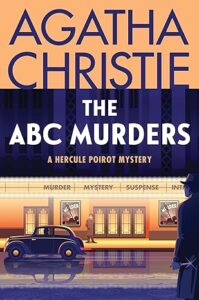| We’ve now posted a total of 17 book reviews. |
| Available now at the Amazon.com website … CLICK HERE! |
| Any and all books purchased through our website cost you nothing extra, but do help support our ongoing efforts. |
 Agatha Christie’s “The ABC Murders” is a sleek machine of dread and design, one of the author’s most modern-feeling Poirot cases. Anonymous letters taunt the detective in advance of killings apparently chosen according to an eerie alphabetical schema—victim, town, date all marching in grim order. The result is both a puzzle and a provocation: a criminal who seems to turn deduction into spectacle, daring Poirot to keep up. Christie harnesses the geography of Britain and the pulse of the railways to create motion and menace; timetables become nerves, stations become stages, and the country begins to feel uncomfortably mapped. Agatha Christie’s “The ABC Murders” is a sleek machine of dread and design, one of the author’s most modern-feeling Poirot cases. Anonymous letters taunt the detective in advance of killings apparently chosen according to an eerie alphabetical schema—victim, town, date all marching in grim order. The result is both a puzzle and a provocation: a criminal who seems to turn deduction into spectacle, daring Poirot to keep up. Christie harnesses the geography of Britain and the pulse of the railways to create motion and menace; timetables become nerves, stations become stages, and the country begins to feel uncomfortably mapped.
Formally, “The ABC Murders” is ambitious without showiness. Captain Hastings returns as our genial narrator, documenting Poirot’s methods and mischief with his usual blend of loyalty and blind spots. Christie interleaves this memoir-like voice with stark, cinematic chapters that widen the lens, letting atmosphere and unease accumulate. The structure gives the book a crisp rhythm: interviews that click, meetings that bristle, and investigative set-pieces where small physical facts—a catalogue here, a ticket there—suddenly carry real charge. Inspector Japp’s practicality grounds the inquiry, while the investigative team’s coordination feels unusually procedural for Christie, foreshadowing the DNA of later crime fiction. As character study, the novel is rich. Poirot is precise and quietly theatrical, yet what stands out is his moral clarity: he keeps returning to the human cost behind the “game.” Hastings provides warmth and comic oxygen, but he also lets us watch how easy it is to be seduced by pattern—how a tidy design can hypnotize even smart observers into missing what matters. “The ABC Murders” populates its pages with clerks, shopkeepers, and travelers who feel recognizably ordinary, which makes the violence feel colder and the investigation more urgent. Christie sketches these lives quickly but tellingly, and her ear for small social tics is as sharp as ever. Thematically, “The ABC Murders” is an inquiry into modern anonymity and the narratives we construct to master fear. Christie toys with the mythology of the serial killer while keeping her fair-play covenant intact. Clues are in plain sight, but their weight shifts as the book proceeds, and the reader is invited—almost dared—to confuse spectacle with truth. Media hysteria, profiling temptations, and the comfort of tidy theories all come under gentle cross-examination. The alphabet gimmick, far from a mere stunt, becomes a conversation about control: who sets the rules of the story, and who mistakes pattern for proof? When Poirot finally articulates his reasoning, it feels less like fireworks than the steady illumination of a dark map. As a reading experience, “The ABC Murders” is brisk, accessible, and quietly unsettling. It showcases Christie’s precision—economical chapters, clean staging, wit kept on a short leash—while stretching the genre toward a larger social canvas. Newcomers will find a fair, impeccably organized mystery that teaches you how to read it as you go; longtime fans will admire how Christie balances clockwork with conscience. The book lingers because it understands a simple, unnerving truth: patterns can comfort, but people—messy, particular, contradictory—are where the answers live. |
